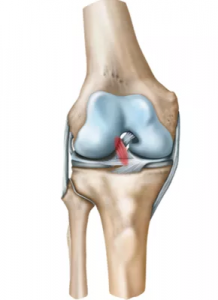Twisting knee injury with pain and swelling – this could be an ACL rupture

The ACL (Anterior Cruciate Ligament) is the main ligament inside the knee that keeps the knee stable. It has important functions both in mechanical terms and by working as a sensor for your joint position sense. It is commonly ruptured with a twisting injury of the knee. This can happen from decelerating rapidly and changing direction or with a collision bending the knee in the wrong direction.
You will often feel a pop or snap at the time of injury. It may be very painful for the first few minutes, but this often settles quite fast. The knee will feel ‘wrong’ and it is unlikely that you will be able to continue play. The knee often swells quickly after a full ACL rupture and can be quite swollen within the hour. Once the initial injury settles down over the first few weeks the knee will feel unstable and may give way under you.
If you think you have this injury it is important to get it checked out by Dr. Amit. It is best to stop sports to prevent further damage. It is important to treat the early phase with rest, ice, compression and elevation in order to minimise the bleeding and swelling. You should avoid any activities that lead to giving way, because each time this happens there can be further damage to the knee. The ACL does not heal on its own and usually needs surgery. Some people who lead sedentary lives can learn to cope without an ACL and don’t need surgery but if you desire to return to active sports then an ACL reconstruction is usually needed.
Treatment involves first confirming the diagnosis and establishing whether any other structures are damaged. This usually means a careful examination and an MRI scan. Often there are meniscal tears in association with an ACL rupture. ACL reconstruction is usually required for sportspeople. Unfortunately the recovery period is long, and required lots of concentrated physio, however the long term results of ACL reconstruction are good. Typically it will be a full year until you are back at your former level of performance.
Dr. Amit specialises in this operation. See the information page on this surgery.
